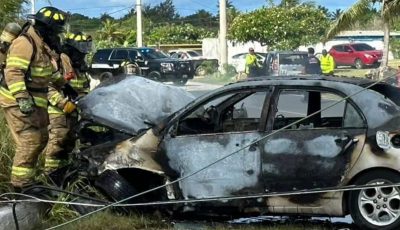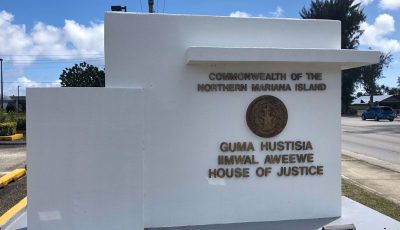Michael A. Jackson wants photos of car excluded at retrial
Michael Anthony Jackson, a man facing a retrial on charges of kidnapping and raping a then-15-year-old girl on Saipan, wants to exclude in the trial photos of a car that he used when the alleged crime happened.
Jackson, through court-appointed counsel Charles P. Reyes Jr., asked the Superior Court to exclude the photographs of his car from presentation at trial based on the doctrine of the “fruit of the poisonous tree.”
In defendant’s motion to suppress photos filed yesterday in court, Reyes said the photographs of Jackson’s car were taken pursuant to an illegal search based on an invalid search warrant.
Associate Judge Joseph N. Camacho set a hearing on the motion for Oct. 5, 2016 at 9am.
Reyes said that on Oct. 9, 2010, on the same day Jackson was arrested, the Department of Public Safety seized his automobile.
Reyes said four days later, after towing and impounding the vehicle, a police detective prepared a search warrant for the car and had Superior Court Associate Judge Kenneth L. Govendo review and sign the warrant.
Police executed the search warrant on Oct. 15, 2010.
Reyes said that in November 2012, the court granted defendant’s motion to suppress, finding that the search warrant was facially invalid for failing to state the items to be seized with particularity and further finding that the facts did not support a good faith exception.
As a result, Reyes said, the court ordered that the government “may not use the items seized pursuant to the vehicle search during its case in chief.”
Reyes said consequently, because of the “fruit of the poisonous tree” doctrine, it is immaterial that the court’s granted suppression order is only confined to the items seized during the illegal search and to any testimony that may relate to those items during or following the search.
Reyes said any photos obtained “but for” the illegal search also have to be excluded pursuant to the exclusionary rule—that is, unless the government can properly carry its burden to show that an exception actually applies, which it has yet to accomplish to date.
Jackson’s retrial will be on Oct. 11, 2016.
On April 26, 2013, the jury found Jackson guilty of kidnapping and sexual assault in the first degree. Camacho, who decided on the misdemeanor charge, also found the defendant guilty of assault.
On May 15, 2013, Camacho slapped the then-34-year-old Jackson with a maximum jail term of 40 years and six months without possibility of parole.
Jackson then appealed. He asked the CNMI high court to reverse his convictions and remand the matter for a new trial, or in the alternative for re-sentencing.
Last Dec. 30, the CNMI Supreme Court reversed the conviction and remanded Jackson’s case to Superior Court for a new trial.
The justices ruled that Camacho erred in not repeating substantive jury instructions at the close of evidence.
The justices said closing instructions allow the jury to focus on the law, the evidence, and its responsibilities in order to arrive at a proper determination.
Police said the girl was walking along Tun Joaquin Doi Road in Finasisu from an Internet café and was on her way home on Oct. 9, 2010 at about 1am when Jackson forced her into his car, brought her to an open field at the Saipan Airport, and raped her inside his car. He then forced the girl to smoke methamphetamine or “ice.”
The girl later managed to run away, police said.


























